Five days workshop for ATL tecahers - organized by Atal Innovation Mission
Teaching and learning go hand in hand. Only a well trained and equipped teacher can facilitate the students to a right direction. Atal innovation mission conducted a workshop of 5 days for ATL teachers at Salwan Public School, old Rajinder nagar. Creativity comes automatically and it can certainly be translated into innovation through proper guidance and motivation and this was the core idea of this workshop. On the first day of the workshop, there was an ideation session and focus on tinkering and its various phases. Thinking in right direction always leads to a perfect destination. By the end of the day, teachers gave a shape to their ideas in the form of a model. Our school team made a model of multilevel smart parking. On the day 2 of the training, we were introduced various electronic components and their use in an effective way . Teachers made beautiful models using conducting tape, conducting pen and light emitting diodes. It was really an enthralling experience for all the teachers . On the same day teachers were introduced Arduino controller board and various sensors. Third day of the training was even more exciting, when teachers learnt to connect sensors with Arduino board and made real prototypes as a solution of various problems in our society. Our school team made automated traffic controller, which would clear the other side of the road after sensing traffic. This prototype was appreciated by all and also showcasing on the AIM official website. We also learnt use of IOT to control our prototypes.We are grateful to Intel mentors to introduce us a new world of technology. On the fourth day of the training we were given different objectives, where we had to design and make a car using given materials, then an obstacle avoider car and finally a car controlled by mobile phone. It was an amazing experience for us as we used various mechanical tools, sensors and IOT to meet all the objectives. Last day of the training was again full of exciting activities. Where we used some very useful sensors as pulse sensor, gas sensor, temperature and humidity sensors. Last two days of the training were conducted by IBM and our sincere thanks to them for giving us such an amazing experience and valuable guidance. As every good thing comes to an end and so our training. At the end of this 5 days long training, we all shared our experiences and wow moments and also owe that after going back to our schools, we will share this knowledge with our students and give our best to achieve the goals. Our heartfelt gratitude to Niti Ayog for providing us such a valuable and informative training and rememberable experience.
Early Childhood Education and Development Programme
A two day Capacity Building Workshop for teachers of DAV was held at DAV Public School, Vasant Kunj, for Primary Teachers, on Early Childhood Education and Development Programme.
Various concepts required for handling the tiny tots of classes 1st and 2nd such as BALA (Building As Learning Aid) and DEAR (Drop Everything and Read), cognitive skill and listening and speaking activities were discussed. The participants discussed the short-term and long-term goals and assessment strategies.
A Two days Workshop on Concept Skill Mapping
Resource person – Ms. Shayda Rana
The workshop began with the recapitulation of previous session, Ms. Shayda again focused on the two key words – KNOW and DO.
KNOW à KNOWLEDGE à CONCEPTUAL UNDERSTANDING
Know means Knowledge, Knowledge of conceptual understanding by the teacher of what concepts she has to take.
DO à SKILL à PROCEDURAL ABILITY
Do means the skill which the teacher wants to develops in her students through the concepts she has chosen.
She then interpret ate and deliver it to her pupil. In classroom the teacher is transacting her knowledge to the students.
How does learning take place?
Humans in their process of learning make various patterns and then make relationship between them to remember and understand. The first pattern humans encounter in their life is the music (The divine music which they carry within them). It is the beat of their heart. If we listen to our heartbeat we will find that there has a pattern (rhythm) which is followed.
Ms Shayda then talks about the place where the teacher works i.e...CLASSROOM. Classroom is made up of four walls. It is like a box, but it is very important for each and every teacher to think out of the box. There is a talking wall in that box where the teacher stands and delivers. It has life in it.
Ms. Shayda inspired all the teachers to consider this box not as a classroom but to think it as an experimental field where continuous research takes place. Finding more innovative ideas and dealing with the differences and problems encountered while teaching learning process.
Ms. Shayda related teaching with the research but the only difference is that teachers do not document their work. Thus she inspired all the teachers to pen down their experiences and work upon to make a written document for assisting the new teachers to guide and enrich them. She emphasized on to connect learning with the real life situation.
What the teachers have to do is prescribed in the textbook. Textbook are the key to the syllabus to be covered in a particular class. Thus a teacher must identify and recognize the concepts included in the chapters given in the textbooks.
The three main problems faced by the teachers are completion of syllabus, time constrain and strength of the class.
We as teachers focus only on the syllabus (content). We only assess the content we seldom focus on the ability of the learning of the students. The questions asked by the teacher are only the recall of the lesson. We only deal with the remembering and understanding but we seldom take the applying, analysis and creativity part. The thing which needs to be developed is the art of studying the lesson.
Before planning, a teacher must study the lesson to be taught. She needs to identify the concepts included in the chapter and relate it to real life situations.
Why all the concepts must be related to the real life situation? It is necessary because learning is defined as the ability to do. Until and unless the child does thing himself he cannot learn.
Thus teacher not only have to be a teacher but needs to become a SMART teacher.
S->Specific, M->Measurable, A->Achievable, R->Realistic, T->Tangible
What is important is KSA. K->Knowledge, S->Skill, A->Attitude.
Participants were told about:
What is meant by concept map? It is a knowledge organizer in the form of a map which describes concepts. It also represents relationship between concepts and sub concepts.
Purpose of concept mapping: Identify concepts being taught and to know gaps and linkages of concepts.
How will it help? It will build conceptual understanding. It is an important tool for teaching learning and evaluating. It makes learning meaningful by bridging the gap between previous and new knowledge.
After this participants were told to do mind mapping. It can be of two types 1. Subject level and 2. Topic level. First individual planning was done in a descriptive pattern by the participants who were taking same class. Hierarchy pattern was made by the participants taking different classes but same subject.
After finding the similarities and differences in individual maps participants were told to prepare a common subject level concept map.
DAY 2:
In the beginning subject level concept maps made on the previous day were discussed.
Englishà It must be divided into four parts: Prose, Poetry, Grammar and vocabulary. Prose can be divided into fictional story, factual, dialogue form, mythological and autobiography. Fictional further can be sub divided into stories based on moral, scientific, theme based, fairy tale and drama or dialogue form.
Vocabulary must include the sight words related to chapter. Teacher must do the model reading for the children. While reading voice modulation, intonation, pause, emotion of the character must be kept in mind. After reading a paragraph, questions can be asked as to evaluate how much the children have comprehended. Related grammar portion can also be taken and for vocabulary meaning of the word, words with same meaning or words with same sound (rhyming words) can be asked.
Life skill integrated questions must be asked from the children as how you have managed the situation, what would have you done or how would you have behaved/reacted.
Life skill integrated in the concept or activities can be divided into 3:
1 Thinkingà Problem solvingà Critical thinkingà Creativity/Decision making
2 Socialà Communication skillà Team skillà Inter personal relationshipàConflict negotiation
3 Emotionalà Self awarenessà Managing angerà Managing stressà Managing empathy
Mathematics:
In class I all the preschool concepts must be revised. Sorting is the first skill that the child learns after this he compares the things(big/small), he then start seriating the things according to its size and make different patterns with objects available (sequencing). Then comes the spatial understanding (in/out, up/down, near/far).
After revising the pre number concepts the teacher should introduce the numbers, concept of zero and concept of ten must be given with the help of concrete objects.
EVS: Inter related topics can be clubbed together to save time.
Ms. Shayda emphasized that concept map should be self explanatory.
After discussing the subject concept map, participants were given a hand out to create a concept map for a particular lesson with the heading: concept identified, activities used, skill developed, life skill integrated in the concept, learning outcomes and formative assessment tools. Hand out of Bloom’s taxonomy was also given to teachers for the reference.
The workshop was ended with the quote: Children are not empty vessels; they are the lamps to be lit.
Workshop on Concept Skill Mapping,
Resource Person: Ms. Shyda Rana, Faculty Development and Research Center, Army Welfare Education Society
The workshop explores Concept Skills Mapping as a learning tool to help teachers to teach and evaluate. As we all know that the child is the heart and soul of the education system, Ms. Shyda very skillfully stressed on the child centered approach. She focused on the main subject whom an educator must always stress upon and the one who matters most to us is ---- the child.
She talked about the Paradigm shift of today’s ideology from teaching to learning. Now role of a teacher is to facilitate and not to teach. She talked about Learning beyond the textbook. A teacher is now an educator and she must connect the classroom practices to the outside world.
A teacher should not only stressed upon the covering (completion) of the syllabus but must work upon to uncover and discover what he is teaching. Syllabus is just a part of the bigger term Curriculum which emphasis on the holistic development of the child.
Ms. Shyda then asked all the educators to add two important words ---- Know and Do, around which they all must work upon.
Know is for Knowledge which is infinite thus there must be a proper gradation of concept according to the stages / age of the child development.
Do stands for the skills, which a child shall acquire while performing the activities designed to attain the specified concept.
Ms. Shyda talked about how Concept Skills Mapping is useful for primary level and why it is to be done.
Concept mapping provides a graphical summary of what students have learned, which in turn will help teacher to detect students prior knowledge and understanding of the concept at each level/class to organize teaching and learning activities in a way that is meaningful to them.
Ms Shyda talked about the types of chart in which Concept mapping can be done i.e.…
1 Hierarchy Chart and 2 Descriptive Charts
Aim: Is to enhance competency in building conceptual clarity. Here she emphasized the use of competency rather than skill, as everybody can learn a skill but when we practice again and again and reinforce our core ability to perform that skill becomes our competency.
Objective:
* To identifying concepts to be internalized by learners at each level.
* To see the gradation of the concepts from one class to the other. To see the inter relationship in the concepts level wise and within the level.
All the participants were divided into different groups according to the subjects and were asked to do concept mapping for the subject given for classes I to IV. Teachers have to read the syllabus identified the concepts hidden in the lessons of the textbook. They have to tell the activity used for the concept and shall know which skills are developed through which activity. They should also integrate life skills in them. Teacher must be aware of the learning outcomes of the activities done.
Thus the workshop was full of interaction, introspection and enriching experience for all of us.
GEG Workshop for teachers:
Resource Person: Ms. Harmeet Kaur
Organised by Google Education Group in association with Learning Links Foundation
Google Education Group in association with Learning Links Foundation brought technology enabled education workshop for the teachers. Workshop availed a platform for participants to come, learn, connect and guide their peers and students to harness the power of technology into their classroom teaching and learning processes using Google tools.
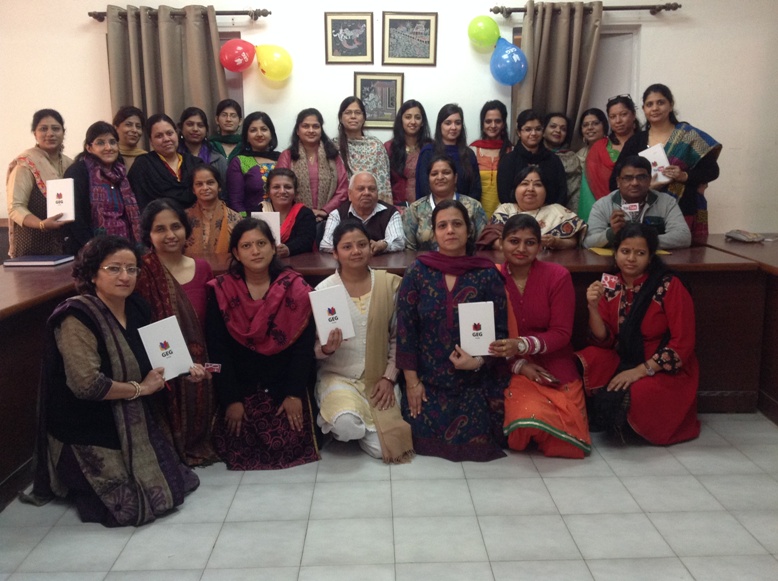
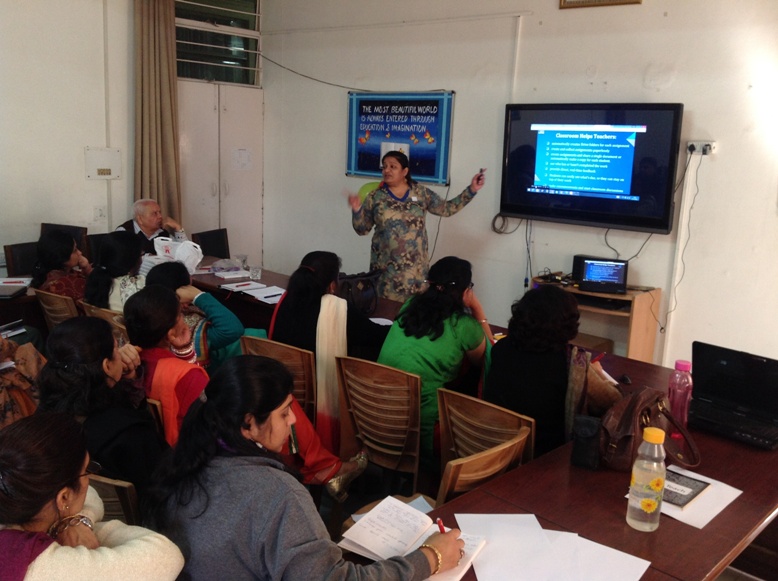
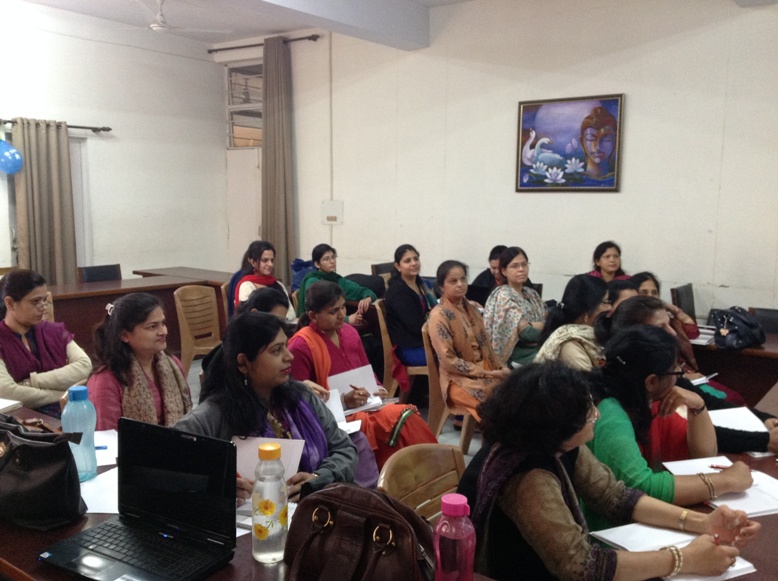
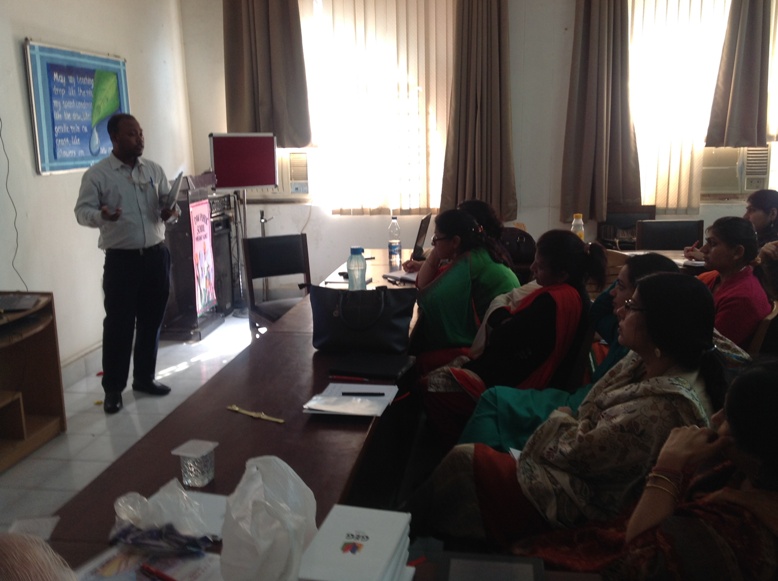
Awakened Citizen Programme
A three Day Workshop was organized by Rama Krishna Mission to train teachers for graded value education. It was attended by Ms. Shilpa, Ms. Madhu Bajaj, Ms. Indira and Ms. Archana.
Seminar on " Image Enhancement"
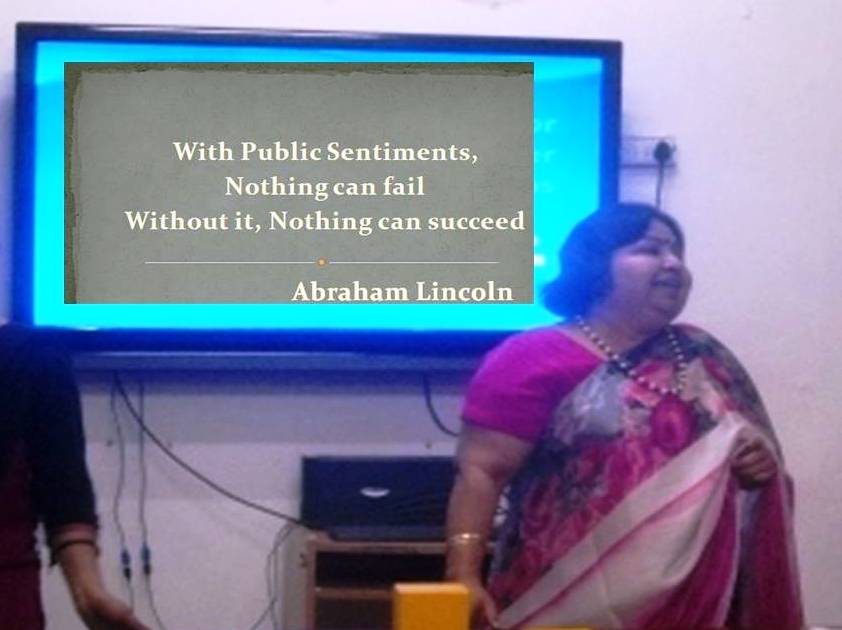 School Principal, Ms Anju Puri conducted a seminar for the school teachers on “Image Enhancement” on 30 June, 2014. She gave a presentation on various aspects of teaching learning process. She also laid emphasis on various effective methods of teaching and learning and positive thinking. DAV Public School, Vasant Kunj organizes ASL Workshop
School Principal, Ms Anju Puri conducted a seminar for the school teachers on “Image Enhancement” on 30 June, 2014. She gave a presentation on various aspects of teaching learning process. She also laid emphasis on various effective methods of teaching and learning and positive thinking. DAV Public School, Vasant Kunj organizes ASL Workshop
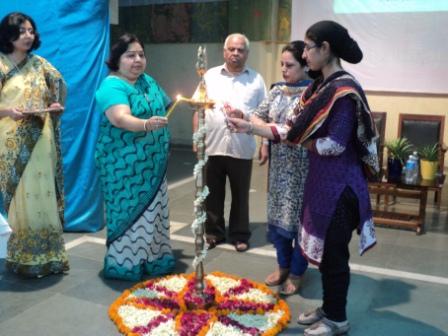
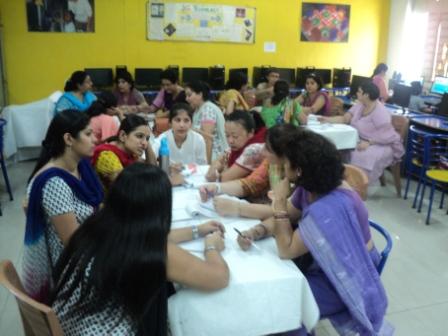
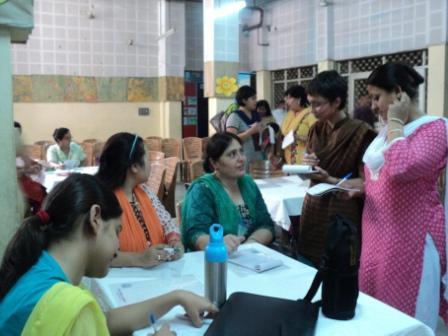
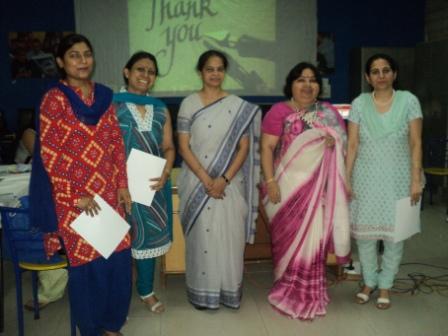
DAV Public School, Vasant Kunj organized a two day workshop on training and assessment of listening and speaking skills for classes VI to VIII. The workshop commenced with lamp lighting accompanied by rendition of mantras to inspire the participants to share and learn from their fellow teachers. The Manager of the School, Sh. H. L. Bhatia addressed the participants stressing the importance of listening to one self and being true to one’s profession by being a lifelong learner.
The in-house resource person, Ms. Manju Arora, PGT English discussed the assessment parameters with the participants from different branches of DAV after introducing the aims of Assessment of Speaking and Listening (ASL) and its necessity. She detailed the aspects of various language functions, effective use of pronunciation, intonation and questioning techniques for effective communication. She shared a lot of activities with the participants on how to enhance the speaking and listening skills of their students and making their classes interactive.
The need to make our learning student centred was also discussed and the prescribed texts were used to devise communicative lesson plans. The participants were suitable guided on the assessment procedure to be followed by involving the participants in role play simulating the exam settings. At the end of the workshop the participants felt that they were competent to assess language, its accuracy and range, lexis and structure, fluency and pronunciation.
The workshop culminated with the Principal, Ms. Anju Puri’s interaction with the participants sharing with them some valuable tips on class management and students’ involvement.
MATHEMATICS SEMINAR-2014
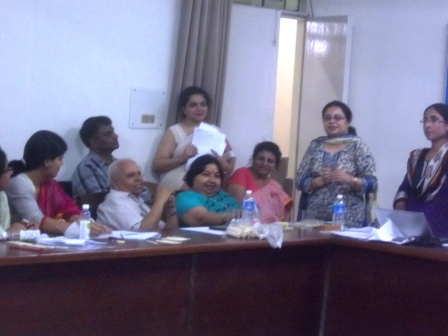
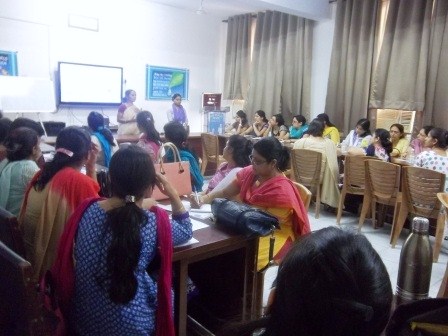
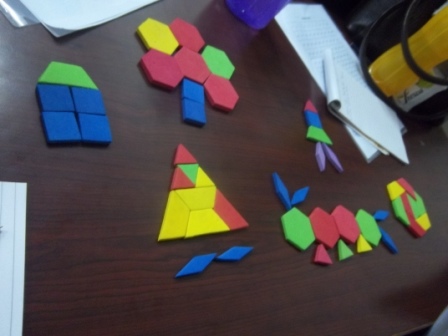
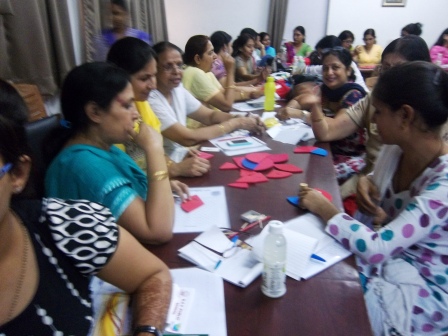
A Mathematics seminar titled “Activity Based Teaching of Mathematics” was conducted at D.A.V. Public School, Vasant Kunj on 27th & 28th of June 2014.The resource persons were Mrs. Ashu Thareja (Miranda House) and Mrs. Jasneet Kaur, Research Fellow (Jamia Milia Islamia).
The workshop commenced with lamp lighting accompanied by rendition of mantras to inspire the participants to share and learn from their fellow teachers. The Manager of the School, Sh. H. L. Bhatia addressed the participants stressing the importance of listening to one self and being true to one’s profession by being a lifelong learner.
Innovative Classroom Practices were recognized as the need of the hour and were presented by the resource persons as focus areas to foster and nurture mathematical skills, especially for the introduction of new concepts in the areas of binary operations (addition, subtraction multiplication , and division ) , fractions , L.C.M & H.C.F.
A thought provoking and novel approach towards teaching fractions, LCM, HCF, tables etc. was the pivotal thrust for the ‘Jodo Gyan’ team who demonstrated their creative approaches through various mathematical kits..
The highlight of the session was the invaluable and enthusiastic exchange of ideas amongst the teachers wherein several pertinent problems were addressed, coupled with a complete consensus for the suggested solutions.
The workshop culminated with the Principal, Ms. Anju Puri’s interaction with the participants sharing with them some valuable tips on class management and students’ involvement.